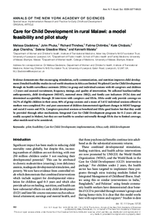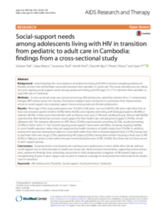Displaying 101 - 110 of 243
This paper describes the piloting of Care for Child Development through six health surveillance assistants (HSAs) in group and individual sessions with 60 caregivers and children <2 years and assessed recruitment, frequency, timings, and quality of intervention.
With the support community and academic partners, a school-based health center administered by a Federally Qualified Health Center developed a plan for outreach, systematic screening and referral to services for newcomer youth.
The current study implemented a concurrent, parallel mixed methods research design, whereby quantitative (survey) and qualitative (focus groups) data were collected simultaneously to explore: (a) the frequency of posttraumatic stress disorder, depression, suicidal ideation, and substance use, (b) trauma exposure at pre-migration, migration, and post-migration, and (c) how youth may cope with these adversities.
This study describes access, utilization and ongoing social support needs among adolescents living with HIV aged 15–17 in transition from pediatric to adult HIV care in Cambodia.
The current study examined family and community factors related to home visiting programme engagement in a sample of 1,024 mothers (primary caregivers, mean age 22.89 years) who participated in family support programmes funded through the US state of Georgia's Maternal, Infant, and Early Childhood Home Visiting programme.
This presentation describes the progress of the "Children and Young People in Out-of-Home Care Innovation Fund Integrated Care " project currently being undertaken by Children's Health Queensland.
This study explored stakeholder perceptions of barriers and facilitators to conversations about sexual health between foster/kinship caregivers and youth in foster care, with the goal of developing a brief, scalable sexual health training for caregivers.
The authors of this study sought to better understand the potential strengths and challenges of medical foster care (MFC) as a placement setting for children with chronic critical illness (CCI).
The objective of this study was to determine if the Power Through Choices (PTC) intervention can increase the use of birth control and reduce pregnancy among system-involved youths living in group care homes.
The aim of this study was to compare the health of 4- to 6-year-old children in out-of-home care (OOHC) in Southern Tasmania, Australia with their peers.


